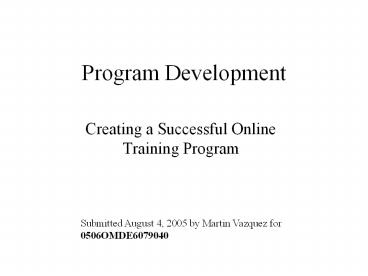Program Development - PowerPoint PPT Presentation
1 / 14
Title:
Program Development
Description:
Program Development Creating a Successful Online Training Program Submitted August 4, 2005 by Martin Vazquez for 0506OMDE6079040 Goals Vision Resources Staff Training ... – PowerPoint PPT presentation
Number of Views:147
Avg rating:3.0/5.0
Title: Program Development
1
Program Development
- Creating a Successful Online Training Program
Submitted August 4, 2005 by Martin Vazquez for
0506OMDE6079040
2
This presentation will develop key elements
required for a successful launch of on-line
training that answer these questions
What is the vision? How do we define it? How will
we organize it? How will we fund it? How will we
manage it? How will we evaluate it?
3
Goals
The first challenge for management is to identify
the business or educational goal or goals the
training will address, that is, the performance
gap it is intended to overcome. Management should
also decide if these goals are best addressed by
instructional design. The goals must also be in
keeping with the scope of the work. (Morrison, p.
374)
4
Vision
Management should ensure that the mission of the
training is in keeping with the overall vision of
the institution. The mission of each sub group
charged with developing the training should be in
line with this vision.
5
Resources
Management must insure that the necessary
resources are available to the developers to meet
the goals and outcomes. Resources include
funding, facilities, equipment, access to experts
and providing the appropriate staffing and/or
hiring consultants as necessary. This management
of resources continues throughout the development
process.
6
Staff
- Management must decide
- who will supervise the groups,
- what personnel will make up each group,
- what experts will be hired,
- and how much time will be allotted to each group
to complete their assignment.
7
Training
Management should also make sure the staff is
adequately trained and prepared to accept the
responsibilities of their task.
8
Schedule of Work
Management must design a production schedule in
keeping with the critical path. This entails
setting the sequence of tasks and deciding which
are of fixed duration, which are resource-driven,
and which are dependent on other tasks.
Milestones and deliverables should be identified
for the project and for each group (Morrison, p.
374-378)
9
Group Supervision
Management will supervise each group and hold
them accountable for meeting their goals and
timelines.
10
Coordination
Management will coordinate the sub-groups to
ensure communication among them, reduce
redundancy of efforts, and resolve problems that
arise between them.
11
Keep the Budget
Management will choose among the four types of
funding - fixed budget, direct charge-back
system, indirect charge-back system, or loan to
develop a project. (Morrison, p. 365). Having
secured and allocated funding, management must
track expenditures and reduce waste.
12
Evaluation
Management must decide upon evaluation standards
and establish what forms of evidence are
acceptable as proof of these standards being met.
13
Project Reporting
Management must specify the time periods of
project reports, their form, what will be
reported, and to whom. Reports are typically
made to stakeholders and clients
14
References
Morrison, G.R., Ross, S.M., Kemp, J.E. (2004)
Designing Effective Instruction, 4th ed. Hoboken,
NJ Wiley Sons































